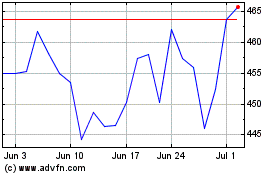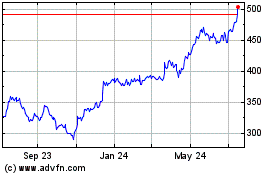Goldman Profit Drops 26% as Market Wobbles -- 2nd Update
October 15 2019 - 3:04PM
Dow Jones News
By Liz Hoffman
Goldman Sachs Group Inc.'s third-quarter profit fell 26% from a
year ago, hit by a slowdown in deal-making and losses on the bank's
stakes in companies.
The bank on Tuesday reported $1.88 billion in net earnings on
$8.32 billion in revenue, roughly in line with what analysts had
expected. But its return on equity -- a measure of how profitably
it invests shareholders' money -- was just 9%, lower than peers, as
it continues to pour money into new initiatives such as consumer
banking, corporate-cash management and ultrafast trading
systems.
Goldman was one of four big banks to report third-quarter
earnings Tuesday. JPMorgan Chase & Co. posted its seventh
straight quarter of higher profits, sending its stock price to a
record. At Citigroup Inc., a lower tax rate helped boost its
profit. Wells Fargo & Co. took a $1.6 billion litigation charge
stemming from its long-running fake-accounts scandal.
The two Federal Reserve interest-rate cuts this summer haven't
yet hit banks' profits, though executives warned a prolonged period
of lower rates would hurt their businesses. For now, mortgage
lending surged as homeowners rushed to refinance and trading fees
rose on money on products tied to interest rates, such as swaps and
mortgages.
Bank of America Corp. will report earnings on Wednesday and
Morgan Stanley on Thursday.
Under Chief Executive David Solomon, Goldman is trying to
broaden out beyond its Wall Street roots. It is building new
businesses in consumer banking and cash management, and recently
launched a credit card, its first, in partnership with Apple
Inc.
Its turnaround is slow and expensive. Goldman said it has spent
$450 million this year on growing online consumer bank Marcus,
launching the Apple card, and integrating a wealth-management firm
that it bought this summer. Non-compensation costs rose 16% in the
quarter, which the bank balanced out by cutting the money it sets
aside for year-end bonuses.
"When you say 'a long time,' that's a subjective word," Mr.
Solomon said in response to a stock analyst's question about when
Goldman's investments would pay off. He said some of the projects
should start bearing fruit within three to five years, and has
promised an in-depth presentation to investors early next year.
Goldman's revenue from mergers and underwriting securities
offerings fell 18% as the initial-public-offering market quieted
and fewer corporate deals were completed. Goldman is the leading
stock underwriter this year, according to Dealogic, but the IPO
business -- worth $9 billion in fees across Wall Street last year
-- looks threatened after a few disastrous debuts.
Peloton Interactive Inc., maker of video-streaming stationary
exercise bikes, and SmileDirectClub Inc., an
at-home-teeth-straightening startup, both stumbled in their IPOs,
led respectively by Goldman and JPMorgan. WeWork's parent company
scrapped its offering entirely.
Goldman took a $267 million hit on its stakes in Uber
Technologies Inc., electronic-trading venue Tradeweb Markets Inc.
and other companies, and took a paper loss of $80 million on a
small stake in WeWork. Revenue from the firm's investing activities
fell 40% to a three-year low.
Revenue from fixed-income trading was up 8% in the quarter but
was down through the first nine months of the year from 2018 and
far off its peak profitability in the years immediately following
the financial crisis. Goldman has been cutting down on the money
available for its traders to put to work, shifting it to
initiatives that are more profitable, such as money management, or
offer more growth opportunity, like credit cards.
JPMorgan's fixed-income revenue was up 25%, while Citigroup's
was flat.
Goldman now oversees $1.8 trillion in its asset-management arm,
up 6% from June 30. It has been trying to grow its business
advising big insurers and pensions on their portfolios, and rely
less on its mutual funds, an industry where prices are under
pressure
In a regulatory filing, Goldman said it was in talks with
"certain governmental and regulatory authorities" to resolve a
yearslong investigation into its dealings with a Malaysian
government fund. Goldman is expected to pay a hefty fine, including
to the U.S. Department of Justice, for overlooking red flags in its
dealings with the fund, known as 1MDB.
It temporarily stopped repurchasing its own shares until it had
disclosed the talks, but Chief Financial Officer Stephen Scherr
said Tuesday it had resumed the buybacks, a key way that banks
reward stockholders.
Write to Liz Hoffman at liz.hoffman@wsj.com
(END) Dow Jones Newswires
October 15, 2019 14:49 ET (18:49 GMT)
Copyright (c) 2019 Dow Jones & Company, Inc.
Goldman Sachs (NYSE:GS)
Historical Stock Chart
From Mar 2024 to Apr 2024

Goldman Sachs (NYSE:GS)
Historical Stock Chart
From Apr 2023 to Apr 2024
